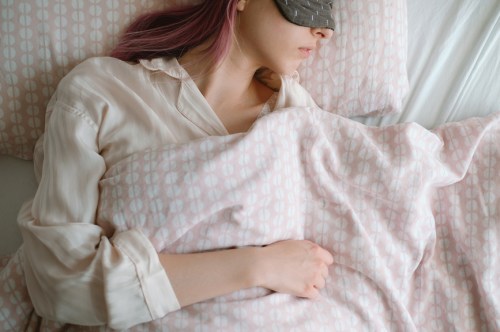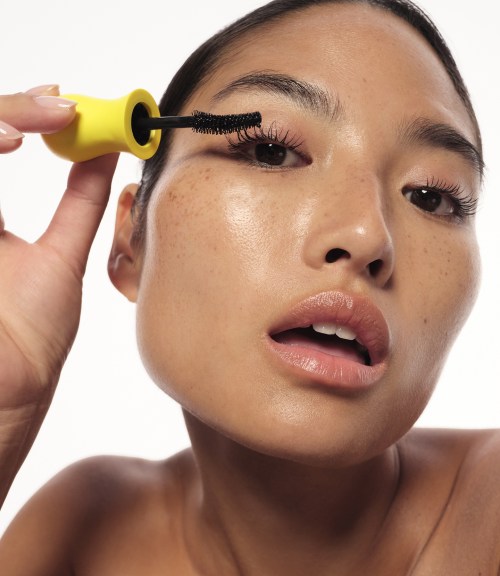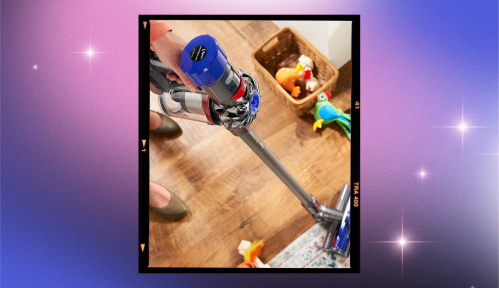Our editors independently select these products. Making a purchase through our links may earn Well+Good a commission
Mouth breathing isn’t just ill-advised because it may be annoying to certain folks who hear it; those who mouth breathe regularly (instead of nose breathing) are actually at higher risk for sleep disorders like sleep apnea and dental-health issues. While it may be possible to reduce your mouth breathing during the day by consciously deciding to nose breathe (assuming you don’t have nasal congestion), it’s much tougher to control how you breathe when you’re sleeping, which is why some people are turning to mouth taping for sleep as a way to “force” themselves to nose breathe.
Experts in This Article
board-certified physician, certified sleep specialist, sleep coach, and founder of The Solution is Sleep
cosmetic dentist
otolaryngologist, facial plastic surgeon, and sleep specialist
Mouth taping for sleep involves placing a piece of tape across your lips before you go to bed at night so that you physically can’t breathe through your mouth while you sleep (and have to nose breathe). Although there haven’t been many studies on the practice itself, the benefits of breathing through the nose while sleeping are plentiful, which is leading some physicians to recommend mouth taping at night, with a few precautionary measures.
Why is it healthier to breathe through your nose instead of your mouth?
Breathing (and smelling, which we do through breathing) is the only reason we have a nose. The mouth, by contrast, exists for speaking and eating in addition to its capacity for breathing. As a result, optimal breathing happens through the nose, not the mouth. “Mouth breathing bypasses the functions of the nose, which include filtering the air we breathe for particles [like allergens and pollution], humidification, and bringing the temperature of the air to body temperature before it enters the lungs,” says Raj TerKonda, MD, FACS, otolaryngologist, facial plastic surgeon, and sleep specialist.
“Mouth breathing bypasses the functions of the nose, which include warming, humidifying, and filtering the air we breathe.” —Raj TerKonda, MD, FACS, otolaryngologist
With this warm, moist air from the nose, the throat and lungs can function better than they can with cooler, drier air from the mouth. In fact, research has shown that those who mouth breathe have lower rates of brain oxygenation—because their lungs can’t absorb the oxygen from the air they’re breathing as effectively—and may even experience less cognitive activity than their nose-breathing counterparts. By contrast, nasal breathing helps “maximize absorption of oxygen from the air you breathe and minimizes irritation in your throat and lungs, all of which can also help improve your sleep quality,” says sleep specialist Angela Holliday-Bell, MD.
For much the same reason (that is, inhaling warmer, moister air), nasal breathing at night can additionally reduce your risk of a dry mouth and sore throat upon waking up. “A drier mouth from mouth breathing can also lower the pH in the mouth increasing your risk for cavities and tooth decay,” says dentist Matthew Asaro, DDS, who also recommends the alternative of nasal breathing for that reason. Not to mention, the lack of saliva production prompted by mouth breathing can allow for more bacteria buildup in the mouth, leaving you all the more likely to wake up with a bad case of morning breath, too.
Well before that point, the closed-mouth position of nasal breathing may also be uniquely beneficial at night through its ability to reduce snoring. “During sleep, with nasal breathing, the tongue and soft palate are less likely to fall back and obstruct the airway,” says Dr. TerKonda. As a result, you’re not only less likely to snore, but you could also experience fewer interruptions in your breathing (aka apneas) during sleep, leading to improved sleep quality and less stress on the body, he adds.
Is mouth taping for sleep a good idea?
Clearly, nose breathing is the medically superior choice over mouth breathing at night. But, is forcing yourself to nose breathe by placing tape on your mouth a wise idea? The answer: “It depends.”
If you don’t have a sleep disorder and you suspect your mouth breathing at night is just a function of a bad habit, it may be worth trying mouth taping to improve your sleep. A small 2015 study of open-mouth sleepers with mild obstructive sleep apnea found that “porous oral patches” (aka porous tape over the mouth) lessened the intensity and frequency of snoring and apneas. And ostensibly, these changes came by way of increasing nasal (over mouth) breathing—which, as noted above, comes with its own health benefits for sleep and beyond.
That said, for some folks who mouth breathe at night, the behavior is a sign of some obstruction limiting their ability to nose breathe, says Dr. Holliday-Bell, “like congestion from allergies or an illness, or an airway obstruction from conditions like enlarged tonsils or adenoids—aka lymph tissue in the upper airway—or a deviated septum.”
In each scenario, simply putting a piece of tape over your mouth won’t solve the issue causing you to mouth breathe at night in the first place; it will just make breathing more difficult. (Imagine taping your mouth shut when you nose is so stuffy that you can’t breathe through it properly.) Instead, you need to seek treatment for the nasal obstruction, either through medication or a procedure performed by an ENT surgeon, says Dr. TerKonda.
How to safely practice mouth taping for sleep at night
If you don’t have a sleep condition or any sort of obstruction preventing you from being able to breathe easily through your nose, and you decide to try mouth taping at night with clearance from your doctor, Dr. Holliday-Bell suggests using a piece of porous medical tape oriented vertically across the upper and lower lips. It’s also worth noting that you should only use a small piece—the size of a postage stamp, says Dr. TerKonda—to safely seal the lips (without locking them shut).
Additionally, Dr. Holliday-Bell says to avoid placing the tape over any hair or open wounds to minimize irritation with removal. “If you find that you’re having any difficulty breathing or anxiety while wearing the tape, you should remove the tape immediately and consult with your medical provider,” she says.
Sign Up for Our Daily Newsletter
Get all the latest in wellness, trends, food, fitness, beauty, and more delivered right to your inbox.
Got it, you've been added to our email list.











